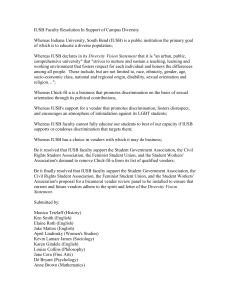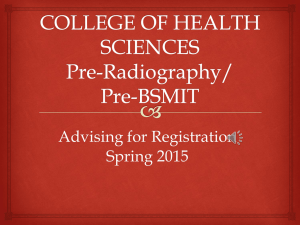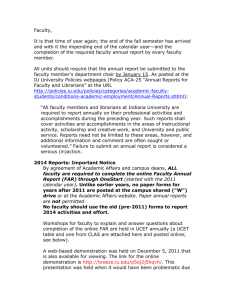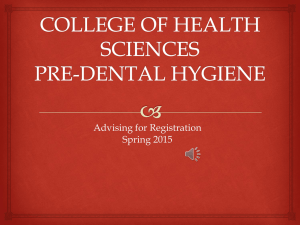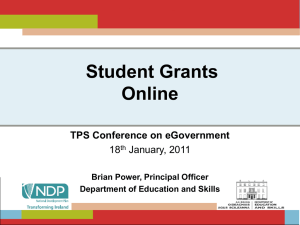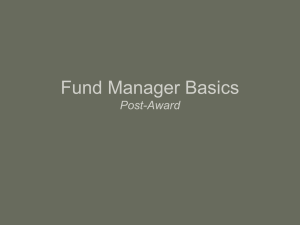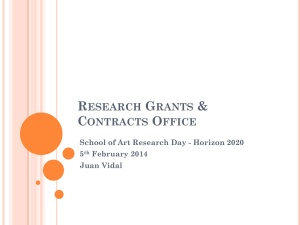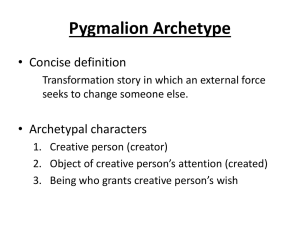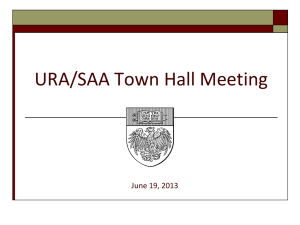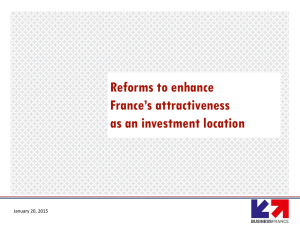Vision 2020 Workshop 2015
advertisement
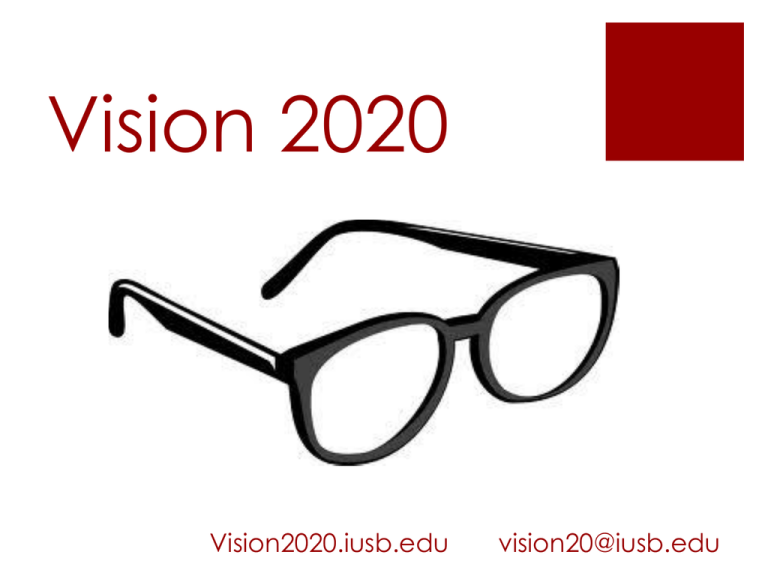
Vision 2020 Vision2020.iusb.edu vision20@iusb.edu Today Overview of grants program Ideas for grants Short presentations by some of last year’s teams Q&A of Vision 2020 committees and teams The Grants Vision2020.iusb.edu vision20@iusb.edu Vision 2020 Small grants program designed to encourage faculty and staff to work together to improve student success Ties to Chancellor’s strategic planning goals for 2020, the IU bicentennial Our Quality Initiative (QI) for reaccreditation by the Higher Learning Commission (HLC) Vision 2020 main goals Focus on student success Retention, persistence, timely graduation Learning, engagement, advising . . . Focus on assessment Collect data, use to improve Focus on collegiality Teams include at least one fulltime faculty member, one staff member Multi-units, roles highly encouraged Vision 2020 Grants Max of $5K/yr; renewed up to 3 years total Re-apply each year Show assessment data Make changes based on data Then baseline budget or external grants Enough for 7-10 new grants/year and continuing grants Budget possibilities Personnel (fringes) Summer Salary (+28.41% benefits) Travel Supplies AY salary (+43.72) Honorarium Student research asst. (0%) Hospitality Other research asst. (+7%) Raffle prizes Participant support (IRB approval) Vision2020.iusb.edu Lastest info—RFP, etc Last year’s successful grant applications LibGuide! Scholarly literature Data from IUSB and national Info on great programs Constantly updated https://www.iusb.edu/vision-2020/ RFP: latest at vision2020.iusb.edu Team info Narrative: What are your goals? How will you know whether you reach your goals? What will you do to reach these goal? To whom? Budget AY 2&3: how are you doing? What will you change? Project Title (short): Year 1 amount: Reviewer: Total points: DRAFT Grants Rubric for Y1 submitted 3/2015 Project leader: Points Area A. Potential to enhance student learning and/or student success, or the environment that enhances student learning and/or student success B. Number of students affected C. Assessment measures (quantitative and/or qualitative). Plan to refine in view of data Fiscal sustainability 35 20 One measure. No plan to use data to fine tune. E. Diversity of project members No alternative funding sources identified No chance for line item in base budget or external funding All one unit (e.g. English faculty), No students F. Timeline Vague and/or unrealistic G. Budget Vague, unrealistic and/or unnecessary for the success of the project Detailed, realistic, and necessary for the success of the project D. 10 5 5 High High potential. Supported by existing research and best practices such as high impact practices or active learning. Data supporting the need for the program is provided or explanation of why there is no data. Strong indication of potential impact/relationship on student learning and/or student success indicators such as retention, persistence and/or timely graduation. Large group (e.g. most Freshmen) Several strong (reliable and valid) quantitative and qualitative measures. Plan to use the data. Identified alternative sources of funding Could become base budget or secure external funding if effective Diverse (e.g. Eng. and Arts faculty, student services, students, community) Detailed and realistic 20 5 Low Modest potential. Not strongly supported by existing research. No data and/or no explanation of why data supporting the need for the proposed program is provided. Weak indication of impact/relationship on student learning and/or potential impact on student success indicators such as retention, persistence and/or timely graduation. Small group (under 20) Overall comments: comments points IRB? NOT needed unless you plan to share publicly But a good idea! Even then, NOT needed for proposal Erika Zynda will help those who get grants and plan to publish Can be Exempt (short form!) if using “normal educational practices”– those from LibGuide Yearly timeline Feb. 1: Proposals due for continuing grants March 1: Proposals due for NEW grants April 1: Notifications of funding April: feedback on all proposals May-August: projects start More information? Vision 2020: vision2020.iusb.edu vision20@iusb.edu Grants information Resources on student success, assessment, IRB, etc Gwynn Mettetal Heading this initiative Can brainstorm, problem-solve, network NOT on grants committee, so no conflict of interest Ideas Vision2020.iusb.edu vision20@iusb.edu Brainstorming project ideas HIGH IMPACT PRACTICES SOME OTHER IDEAS (Kuh, 2008) Advising changes First year seminar and experiences IU Flags and similar Common intellectual experiences Tutoring programs Learning communities Supplemental instruction Writing-intensive courses Mentoring programs—seniors mentor freshmen? Collaborative assignments and projects Office for Service Learning Undergraduate research Diversity/Global learning Service-Learning, communitybased learning Ways to meet “unmet financial needs” Second chance scholarship (completion) More job creation in community—incentive to graduate Internships Publicize 80-20 flip (in high school, teachers give you 80%; in college you learn 80% on your own) Capstone courses and projects Changing student mindset—intelligence is not set, but can improve Ideas based on IUSB data . . . Improve first semester GPA by doing (your idea here) Why? First term GPA of 2.5 or up— 70% are here the next fall First term GPA below 2.5-Only 22% here the next fall Improve funding for low income students by (your idea) Why? High income students–73% here the next fall Low income students—63% here the next fall Even more project ideas Dept. Data Drilling—support and encouragement for depts who want to explore the data on their classes or majors Ways to encourage our best teachers to teach freshman classes Encouraging student-instructor interaction—”lunch with your professor” coupons? Change classroom teaching strategies to be more active/ higher order More jobs on campus for students. Work-study “clearinghouse” or matching service Look for “hidden barriers” to student success, eg course scheduling conflicts, difficulty finding needed forms and signatures Ideas to help students in high DFW courses Ways to encourage study groups “Finish in Time” video https://www.youtube.com/watch?v=ulptCQhAjy0 Other sources of ideas Tinto’s “Completing College” Chambliss & Takacs “How College Works” Washington Monthly September 2013 issue on colleges Vision 2020 Libguide (link on vision 2020 website) Last year’s grants Vision2020.iusb.edu vision20@iusb.edu 2020 grants for 2014-15 U100 Scholar Athletes Bruce Watson Summer workshops for students with disabilities Jim Hasse CLAS internships database Gail McGuire Summer Bridge campus pride Ginny Heidemann High Impact Practices for U100 Kathy Sullivan IUSB Brave (sexual assault) Tiny Shelves concert series Online alcohol and drug abuse education Questions? Brainstorming!
